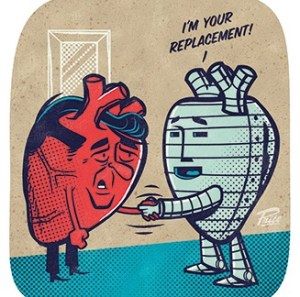In October, Medical Observer asked me to summarise 2013 research into cardiac risk factors. I discovered Shakespeare had got there first.
Hearts. Don’t you just love them?
Yet despite their adorable cardiac shape, they cop a whole lot of negative medical press. Red clots, black infarcts and yellow fatty deposits. Medical Observer’s colour photos serve us a weekly palette of coronary fragility.
We all know the big CV risks factors, but recent research has focused on numerous, minor associations. Even Shakespeare had an inkling we would eventually find plenty of quirky factors, when he wrote ‘This heart shall break into a hundred thousand flaws.’
In fact, none better than the English bard to lead us through 2013’s research into cardiac risk factors.
- False face must hide what the false heart doth know.
Here, Shakespeare predicted that the facial signs of ageing are independent predictors of coronary events. The Copenhagen Heart Study demonstrated that those whose faces ‘look old’ are actually 57% more likely to have a heart attack at a given age.
The facial measures were receding hairline at the temples, baldness at the head’s crown, creased earlobes, and xanthelasmata. No mention as to whether hair transplants are protective.
- Mine eye and heart are at a mortal war.
The poet’s warning still rings true for all dieters, whose eyes can spy atherogenic food at fifty paces. But luckily the European Heart Journal published a cohort study which found that participants with the highest chocolate consumption – six grams daily – had a 39% lower relative risk of MI compared with two grams-per-day consumers.
Flavanols in cocoa appear to provide the protection, but let’s face it; who ever needs to read beyond the simplistic conclusion when a study shows a positive outcome for chocolate, red wine, coffee or sex?
- Talking of sex, the line ‘Taming my wild heart to thy loving hand’ would apply to the American Heart Association’s recent detailed guidelines around sexual activity for people with heart disease.
Interestingly, the authors recommend that the loving hand which tames your wild heart should belong to your spouse. Extramarital sex, they warn, poses its own cardiac risk.
The guidelines also discuss the safety of various sexual positions. Presumably the very safest position is a few suburbs away from one’s lover.
- My tongue will tell the anger of my heart, or else my heart concealing it will break.
It seems even telling people you are stressed increases CV risk by half. The UK’s Whitehall II study adjusted for biological, behavioural, psychological stress and social risk factors, and still found that those who reported high stress were 49% more likely to have an infarction or coronary death. ‘For a light heart lives long.’
- But this most foul, strange and unnatural.
Hamlet’s ghost has recently been found haunting wind farms. Professor Simon Chapman attracts controversy, most famously in his battle against tobacco companies; he is Australia’s wolf in plain packaging. But recently he exposed those who tilt against windmills, listing their foul, strange and unnatural claims.
Opponents claim wind farms cause heart disease and hypertension, along with vibrating lips (at 10km from the turbines), goats dropping dead and birth defects. My favourite, however, is ‘echidna disorientation’; how did they know where the echidnas wanted to go?
- The final quote comes not from Stratford-upon-Avon, but Emerald City. Hearts will never be practical until they can be made unbreakable, said the Wizard of Oz.
Professor John Fraser’s team at Brisbane’s Prince Charles Hospital have decided the surest way to avoid an infarct is make a metal heart. Their world-leading artificial heart may soon offer a viable alternative to heart transplants, and its titanium coating will circumvent Tin Man’s rust problem.
The project’s terms of reference were simple: Stiffen the sinews, summon up the blood.


Sheer and utter brilliance, Justin! Taking the art of medicine to a whole new level. The Bard of Avon would be chuffed, I’m sure.
LikeLike
How I wish I’d thought of this first! (or maybe thought of Shakespeare first…) A great insight, thank you
LikeLike
Thanks Genevieve and Anne: means a lot coming from two medical writers like yourselves.
Anne, I love the quote at the start of your recent blog http://www.anneharrison.com.au/medical-english-ii/
“I speak French to my ambassadors, English to my accountants, Italian to my mistress, Latin to my God and German to my horse.”
Frederick the Great of Prussia
Thank God his horse could never swap stories with his mistress!
LikeLike